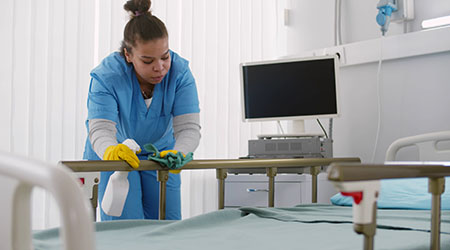If hospitals are inadequately cleaned, doctors' and nurses' hands will be re-contaminated seconds after they are washed — when they touch a keyboard, open a supply closet, pull open a privacy curtain, or contact other bacteria-laden surfaces.
Twenty-six percent of supply cabinets were contaminated with methicillin-resistant Staphylococcus aureus (MRSA), while 21 percent were contaminated with vancomycin-resistant Enterococcus (VRE), according to a John Hopkins Hospital study. That’s not the only thing that could be contaminated in hospitals. Keyboards are another reservoir of deadly bacteria. So much so that a few hospitals are installing washable keyboards, including one that sounds an alarm if it isn’t disinfected properly.
It is likely that superbugs like Candia auris (C-auris) and MRSA have become resistant to disinfectants over the last two years as organizations have focused in on materials that kill the spread of the coronavirus.
Disinfecting surfaces and patients’ rooms once a day might not be enough. If anything, they might be training superbugs to become stronger. On average, an environmental services technician is allowed 15 minutes to process an occupied, semi-private patient room – all of which include seven to ten touchpoints.
Once they leave that room, surfaces are contaminated very quickly. We can begin to see which objects require special attention and constant cleaning and sanitation. There are some highly contaminated surfaces, such as overbed tables, which despite being lower-touch surfaces in the ICU, are very high-touch surfaces in the general patient room.
Some touchpoints have nooks and crannies that can be difficult to clean. Meanwhile, these touchpoints can be close to the patient, and they might not practice the same level of hygiene as healthcare workers. Additionally, surfaces such as bedrails — the No. 1 frequently touched object in the room — might only be cleaned by environmental staff once per day. Knowing that MRSA alone can create an entire new generation in about 30 minutes, one day allows significant contamination to persist and worsen.
Armed with this information, healthcare systems and infection control specialists should develop new strategies and technologies to back up the daily cleaning routine. Keeping up with microbes and eliminating them before they can hitch a ride on the next person or surface until they find the path to transmission is a constant battle.
The British National Health Service recognizes that intensive cleaning is a bargain compared with the cost of treating infections. By nearly doubling cleaningstaff hours on one ward, a hospital in Dorchester reduced the spread of MRSA by 90 percent, saving 312 times the added cleaning costs.

 What 'Light' Daily Cleaning of Patient Rooms Misses
What 'Light' Daily Cleaning of Patient Rooms Misses Sprinkler Compliance: Navigating Code Mandates, Renovation Triggers and Patient Safety
Sprinkler Compliance: Navigating Code Mandates, Renovation Triggers and Patient Safety MUSC Board of Trustees Approves $1.1B South Carolina Cancer Hospital
MUSC Board of Trustees Approves $1.1B South Carolina Cancer Hospital Study Outlines Hand Hygiene Guidelines for EVS Staff
Study Outlines Hand Hygiene Guidelines for EVS Staff McCarthy Completes $65M Sharp Rees-Stealy Kearny Mesa MOB Modernization
McCarthy Completes $65M Sharp Rees-Stealy Kearny Mesa MOB Modernization